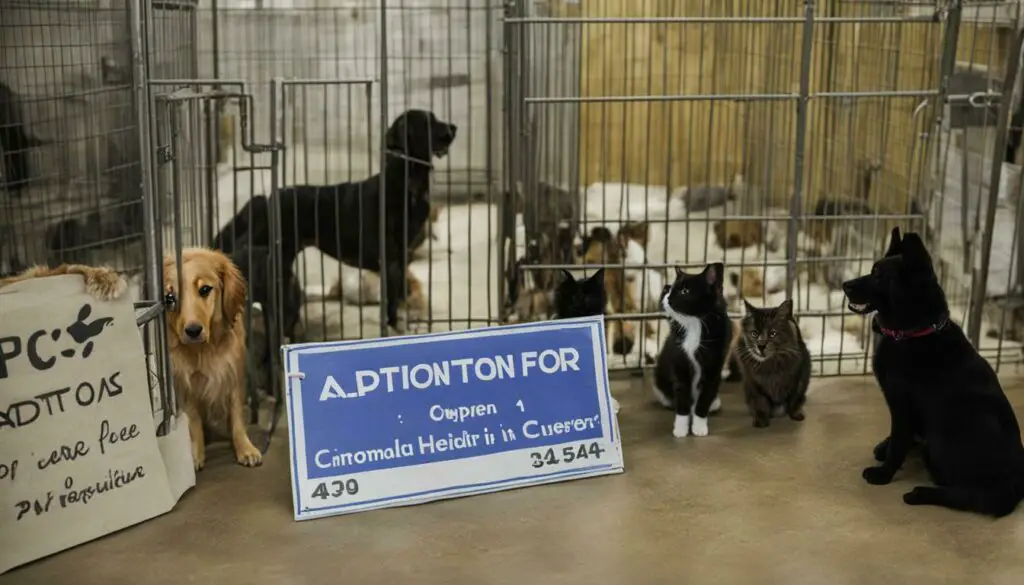Rehoming fees play an essential role in the pet adoption process, ensuring the well-being and safety of animals in need of new homes. When someone decides to rehome a pet, a rehoming fee is charged to cover expenses associated with caring for the pet and finding it a suitable home. This fee helps recoup costs for vaccinations, spaying/neutering, and other necessary pet care.
Charging a rehoming fee not only helps cover the costs of ensuring the pet’s health and well-being but also serves as an indicator of the adoptive parent’s commitment and financial stability. By charging a fee, potential adopters demonstrate their dedication to providing a loving and responsible home for the pet.
Additionally, rehoming fees act as a protective measure for the pets. They help prevent them from being acquired by individuals who may not have the proper resources or intentions to care for the animal. By charging a fee, the pet’s welfare is prioritized, ensuring they are placed in a safe and secure environment.
Key Takeaways
- A rehoming fee is charged when someone rehomes a pet, to cover expenses for their care and finding them a suitable home.
- Rehoming fees help recoup costs for vaccinations, spaying/neutering, and other necessary pet care.
- Charging a rehoming fee demonstrates the adoptive parent’s commitment and financial stability.
- Rehoming fees protect pets from potential mistreatment or neglect by ensuring they are adopted by responsible individuals.
- The amount of the rehoming fee can vary based on factors such as the pet’s age, breed, health, and location.
Understanding Rehoming Fees: A Closer Look
Before delving deeper into rehoming fees, let’s explore what this term actually means and why it matters in the world of pet adoption. A rehoming fee is a fee that is charged when someone rehomes a pet. It serves multiple purposes and is an important component of the pet adoption process.
Rehoming fees can vary, with an average range of $25 to $100. The fee is used to recoup expenses associated with caring for the pet, such as vaccinations, spaying/neutering, and other necessary veterinary treatments. Charging a rehoming fee also helps ensure that the adoptive parent is serious about providing a good home and has the financial resources to properly care for the pet. By requiring a fee, it helps protect the pet from potentially being acquired by individuals who may mistreat or neglect them.
Various factors can influence the rehoming fee amount. These factors include the age, breed, health condition, and location of the pet. For example, a purebred or rare breed may command a higher fee, while a senior or special needs pet may have a lower fee. The fee amount is typically set by the individual or organization facilitating the adoption, taking these factors into consideration.
| Factor | Explanation |
|---|---|
| Age | Younger pets may have higher fees due to their longer expected lifespan and potential for additional medical care. |
| Breed | Rare breeds or purebred animals may have higher fees due to their desirability and demand. |
| Health Condition | Pets with pre-existing medical conditions may have lower fees to account for potential ongoing care. |
| Location | Geographical location can influence fees based on factors such as local demand and cost of living. |
Charging a rehoming fee is an important aspect of ensuring the safety and well-being of the pets being adopted. It not only helps cover essential expenses but also acts as a deterrent for individuals who may not be genuinely committed to providing a loving and responsible home. By understanding the significance of rehoming fees, we can support responsible pet adoption and contribute to the overall welfare of animals in need.

The Benefits of Rehoming Fees
Rehoming fees provide numerous benefits for both pet owners and animals, serving as a crucial aspect of responsible pet adoption. These fees, typically ranging from $25 to $100 on average, play a vital role in ensuring the well-being and safety of pets. By recouping expenses for vaccinations, spaying/neutering, and other necessary care, rehoming fees help support the overall health of the pet.
One of the key advantages of charging a rehoming fee is that it helps filter out potential adopters who may not be fully committed to providing a good home. By requiring a financial investment, it demonstrates that the adoptive parent is serious about the responsibilities that come with pet ownership. This financial commitment shows that they have the necessary resources to provide proper care and support for the pet, reducing the risk of the pet being abandoned or mistreated.
Moreover, rehoming fees serve as a protective measure for the pets themselves. By deterring individuals who may have ill intentions, such as using the pet for abuse or neglect, the fee acts as an additional safeguard. This helps ensure that pets are placed in secure and loving homes, minimizing the risk of harm.
| Factors Affecting Rehoming Fees | |||
|---|---|---|---|
| Age | Breed | Health Condition | Location |
When determining the amount of the rehoming fee, various factors come into play. The age, breed, health condition, and geographic location of the pet can all influence the fee amount. For example, purebred animals or those with specific desirable traits may command a higher fee. Similarly, if the pet requires additional medical attention or comes from an area with a high demand for adoption, the fee may also be adjusted accordingly.
In conclusion, rehoming fees offer multiple benefits to both pets and adoptive parents. They help cover essential expenses, demonstrate commitment from the adoptive parent, and safeguard the well-being of the pet. By charging a reasonable rehoming fee, responsible pet adoption can be promoted, ensuring that pets find loving, lifelong homes with caring owners.

How Much are Rehoming Fees?
Rehoming fees can vary depending on various factors, including the pet’s age, breed, health condition, and location. These fees typically range from $25 to $100, with the average fee falling around $50. The specific amount charged is determined by the organization or individual rehoming the pet and is used to recoup expenses associated with the pet’s care.
Charging a rehoming fee serves multiple purposes. Firstly, it helps cover the cost of necessary vaccinations, spaying or neutering, and other medical treatments that the pet has received. This ensures that the pet is healthy and ready for adoption, and also helps protect the new owner from unexpected veterinary expenses.
Rehoming fees also serve as an indicator of the adoptive parent’s commitment and financial capability to care for the pet. By charging a fee, it demonstrates that the adopter is serious about providing a good home and has the resources to meet the pet’s needs.

In addition to these benefits, rehoming fees also help safeguard the welfare of the pet. By charging a fee, it deters individuals who may have ill-intentions or who are unable to provide proper care from adopting the pet. This helps ensure that the pet is placed in a safe and loving environment.
| Pet’s Age | Average Rehoming Fee |
|---|---|
| Puppies or Kittens | $50 – $100 |
| Adult Dogs or Cats | $25 – $75 |
| Senior Pets | $25 – $50 |
It’s important to keep in mind that while rehoming fees can provide valuable support for pet adoption, the primary goal is to find suitable and loving homes for the animals. If the fee poses a financial burden for a potential adopter, organizations and individuals may consider waiving or reducing the fee on a case-by-case basis, ensuring that the focus remains on the best interest of the pet.
The Difference Between Rehoming Fees and Adoption Fees
Although rehoming fees and adoption fees are often used interchangeably, they serve different purposes within the pet adoption process. Rehoming fees are typically charged by individuals or organizations when someone is rehoming a pet. These fees help cover the costs associated with caring for the pet, such as vaccinations, spaying/neutering, and other necessary expenses. On the other hand, adoption fees are typically charged by animal shelters or rescues and are used to support their ongoing operations and care for other animals.
Rehoming fees are important for several reasons. First, they ensure the financial stability of potential pet owners, demonstrating their commitment to providing a good home for the animal. By charging a rehoming fee, adoptive parents show that they have the necessary resources to care for the pet and cover its future needs. This helps protect the pet from potentially being acquired by individuals who may not be able to provide proper care.
Furthermore, rehoming fees play a crucial role in animal welfare. They help prevent pets from being used for abuse or neglect by individuals who may acquire them for malicious purposes. These fees act as a deterrent and ensure that pets are placed in responsible and caring homes. Additionally, the fee amount can be influenced by various factors, such as the pet’s age, breed, health condition, and location. It is important to consider these factors when determining an appropriate rehoming fee.

Summary:
- Rehoming fees and adoption fees have different purposes in the pet adoption process.
- Rehoming fees cover the costs of caring for the pet, while adoption fees support the operations of animal shelters and rescues.
- Rehoming fees ensure the financial stability of potential pet owners and protect pets from potential abuse or neglect.
- The amount of the rehoming fee can be influenced by factors such as the pet’s age, breed, health condition, and location.
| Rehoming Fees | Adoption Fees |
|---|---|
| Charged by individuals or organizations rehoming a pet | Charged by animal shelters or rescues |
| Cover the costs of caring for the pet | Support the operations of shelters and rescues |
| Demonstrate the financial capability of adoptive parents | Provide funds for ongoing operations and care for other animals |
| Protect pets from potential abuse or neglect | Ensure responsible and caring homes for pets |
Why Do People Charge Rehoming Fees?
People charge rehoming fees to ensure that the pets they are rehoming receive the necessary care and to gauge the commitment level of potential adopters. These fees serve as a way to recoup expenses incurred during the pet’s time in their care, including vaccinations, spaying/neutering, and other necessary veterinary services. By charging a rehoming fee, I can ensure that the pet is going to a responsible home that can provide for its needs.
Furthermore, charging a rehoming fee helps protect the pet from potential abuse or neglect. It demonstrates that the adoptive parent is financially capable of taking care of the pet’s needs, such as providing food, shelter, and routine veterinary care. It also deters individuals who may have ill intentions, as they are less likely to pay a fee and go through the adoption process if they have malicious intentions.
Factors Affecting Rehoming Fees
Several factors can influence the amount of the rehoming fee. These include the pet’s age, breed, health condition, and location. For instance, a younger or purebred pet may have a higher fee compared to an older or mixed-breed pet. The fee may also vary depending on the region, with higher fees typically found in urban areas where the cost of living is higher.
Ultimately, charging a rehoming fee is essential to safeguard the safety and well-being of the pet. The fee helps ensure that the pet is placed in a loving and responsible home, while also covering the costs associated with caring for the pet during its time in my care. It serves as a deterrent to potential abusers and helps support animal welfare by providing funds that can be used to rescue and care for other animals in need.

| Benefits of Rehoming Fees |
|---|
| Ensures necessary care for pets |
| Gauges commitment level of potential adopters |
| Protects pets from abuse or neglect |
| Recoups expenses for vaccinations and other services |
| Supports animal shelters and rescues |
Factors Affecting Rehoming Fees
Several factors come into play when determining the appropriate rehoming fee for a pet, as each pet’s circumstances are unique. These factors can influence the fee amount and help ensure that the fee aligns with the pet’s needs and the adoptive parent’s ability to provide proper care.
One of the primary factors is the pet’s age. Younger animals, such as puppies and kittens, may require more vaccinations, deworming, and ongoing care compared to adult animals. As a result, the rehoming fee for a younger pet may be slightly higher to cover these additional costs.
Breed can also impact the rehoming fee. Some breeds may have specific health issues or require specialized care, which can increase the overall expenses associated with their adoption. It is essential to consider these factors when setting the fee to ensure that the adoptive parent is adequately prepared to meet the breed’s specific needs.
Additionally, the pet’s health condition can affect the fee. Pets with pre-existing medical conditions or those requiring ongoing treatments may have higher rehoming fees to account for their healthcare needs. This ensures that the adoptive parent can afford the necessary medical care and provides a higher level of assurance that the pet will receive the treatment it requires.
| Factors Affecting Rehoming Fees |
|---|
| Pet’s Age |
| Pet’s Breed |
| Pet’s Health Condition |
Ensuring the Safety and Well-being of Pets
Rehoming fees play a crucial role in safeguarding the welfare of pets, acting as a deterrent to potential adopters with ill intentions. By charging a rehoming fee, responsible pet owners and animal shelters ensure that only committed individuals or families who are financially capable of providing proper care and support for the pet are considered for adoption.
One of the key benefits of rehoming fees is the protection they offer to animals from potential abuse or neglect. By requiring a financial commitment upfront, potential adopters are more likely to carefully consider the responsibility of owning a pet and are less likely to acquire one on a whim. This helps to ensure that pets are placed in homes where they will receive the love, care, and attention they need and deserve.
The amount of the rehoming fee can vary depending on various factors such as the pet’s age, breed, health condition, and location. This ensures that the fee is fair and reasonable, taking into account the pet’s specific needs. It also helps animal shelters and rescues recoup some of the expenses incurred in providing necessary vaccinations, spaying/neutering, and other essential care before the pet is rehomed.

Table 1: Factors Affecting Rehoming Fees
| Factor | Explanation |
|---|---|
| Age | Younger pets may require more vaccinations and initial care, which can increase the rehoming fee. |
| Breed | Rarer or more desirable breeds may have higher rehoming fees. |
| Health | Pets with pre-existing medical conditions may require ongoing treatment, which can influence the fee. |
| Location | The cost of living or demand for pets in a particular area can impact the fee. |
By charging rehoming fees, animal shelters and rescues can continue their important work of providing care and support to other animals in need. The funds generated from these fees help cover operating expenses, medical treatments, and the overall well-being of the animals awaiting adoption.
In conclusion, rehoming fees are not only necessary for financial reasons but also serve as a mechanism to ensure the safety and well-being of pets. By charging these fees, pets are protected from potential mistreatment or negligence, and responsible pet ownership is promoted. It is crucial for potential adopters to understand the importance of rehoming fees and their role in supporting animal welfare.
The Financial Responsibility of Pet Ownership
Charging rehoming fees helps ensure that potential pet owners have the necessary financial resources to provide for the pet’s ongoing needs. When adopting a pet, there are various expenses to consider, such as vaccinations, spaying/neutering, and other essential care costs. By charging a rehoming fee, it ensures that the adoptive parent is financially capable of meeting these requirements and providing a comfortable life for their new furry family member.
Not only does the rehoming fee demonstrate financial responsibility, but it also helps protect the welfare of the pet. By requiring a fee, it deters individuals who may have ill intentions or lack the means to properly care for a pet from adopting. This helps prevent potential abuse, neglect, or improper treatment of animals. The fee acts as a safety measure, ensuring that pets are placed in loving and responsible homes.
Factors such as the age, breed, health, and location of the pet can influence the rehoming fee. These factors may impact the initial cost of caring for and preparing the pet for adoption. For example, younger animals may require more vaccinations or treatments, while certain breeds may have specific health considerations. Additionally, the cost of living in different areas can affect the overall fee. It’s important to consider these factors when determining an appropriate rehoming fee to ensure it reflects the needs and expenses associated with each individual pet.
| Pet’s Age | Breed | Health Condition | Location |
|---|---|---|---|
| Puppies or kittens | Purebred or rare breeds | Require ongoing medical treatment or medication | High-cost cities or regions |
| Adult or senior | Mixed breed or common breeds | Healthy with no specific health issues | Low-cost areas |
Charging a rehoming fee is crucial for the safety and well-being of pets. It helps ensure that pets are placed with responsible owners who can afford their care. Additionally, the fee can provide vital funds to animal shelters and rescues, supporting their ongoing operations and enabling them to continue providing care for other animals in need. By recognizing the benefits of rehoming fees, we can help promote responsible pet adoption and create a positive impact on animal welfare.

Additional Resources:
- Rehoming Fees: A Comprehensive Guide
- The Importance of Responsible Pet Adoption
- Financial Planning for Pet Ownership
The Impact of Rehoming Fees on Animal Shelters and Rescues
Rehoming fees have a positive impact on animal shelters and rescues, allowing them to continue their vital work in rescuing and rehoming animals. These fees serve as a valuable source of revenue for these organizations, helping cover the costs of providing food, shelter, veterinary care, and other essential services to pets in need. By charging rehoming fees, shelters and rescues can ensure the financial sustainability of their operations, enabling them to help more animals in the long run.

Furthermore, rehoming fees act as a deterrent for individuals who may not be fully committed to providing a loving and responsible home for a pet. By requiring a financial investment upfront, shelters and rescues can weed out potential owners who may not be prepared to handle the responsibilities associated with pet ownership. This helps safeguard the well-being of the animals and reduces the likelihood of pets being returned or abandoned.
In addition to their financial benefits, rehoming fees also contribute to the overall welfare of animals. By charging these fees, shelters and rescues can ensure that pets are placed in homes where they will receive proper care and attention. It demonstrates the adoptive parent’s commitment to assuming the financial responsibility of pet ownership, including providing necessary medical treatments, vaccinations, and daily care.
Table: Impact of Rehoming Fees on Animal Shelters and Rescues
| Benefits | Description |
|---|---|
| Financial sustainability | Rehoming fees help generate revenue to support shelter operations and rescue efforts. |
| Responsible adoption | Charging fees ensures that potential adopters are financially capable and committed to providing proper care for the pet. |
| Reduced returns and abandonment | Requiring a financial investment upfront discourages impulsive adoptions and helps prevent pets from being returned or abandoned. |
| Improved animal welfare | By charging fees, shelters and rescues can ensure pets are placed in homes where they will receive appropriate care and attention. |
Overall, rehoming fees play a crucial role in supporting the work of animal shelters and rescues. By providing much-needed financial resources and encouraging responsible adoption, these fees contribute to the well-being of pets and help ensure their long-term happiness in loving homes.
Tips for Determining an Appropriate Rehoming Fee
Setting an appropriate rehoming fee requires careful consideration of various factors to strike a balance between covering costs and attracting potential adopters. Here are some guidelines to help determine an appropriate fee:
- Research local adoption fees: Start by researching the average adoption fees in your area to get an idea of the general range. This will give you a baseline to work with.
- Evaluate the pet’s needs: Consider the specific needs of the pet you are rehoming. If the pet requires extensive medical care or has unique needs, you may need to adjust the fee accordingly.
- Consider the pet’s age and breed: Younger pets and popular breeds often have higher rehoming fees, as they are in higher demand. Older pets or mixed breeds may have lower fees.
- Factor in the pet’s health: If the pet has already received vaccinations, been spayed/neutered, or received other medical treatments, you can incorporate these costs into the rehoming fee.
- Assess the local market: Take into account the demand for pets in your area. If there is a high demand, you may be able to set a slightly higher fee.
By considering these factors, you can set an appropriate rehoming fee that not only covers your expenses but also attracts potential adopters who are committed to providing a loving and responsible home for the pet.
| Factors to Consider | Rehoming Fee Guideline |
|---|---|
| Younger pets or popular breeds | $75 – $100 |
| Older pets or mixed breeds | $25 – $75 |
| Pets requiring extensive medical care | Varies based on expenses |
| Pets with basic vaccinations and spaying/neutering | $50 – $75 |
Remember, it’s important to be transparent about how the rehoming fee is used and to communicate its significance in supporting animal welfare. By setting an appropriate fee and educating potential adopters, you can help ensure that the pets find loving homes where they will be well cared for and cherished.

Educating Potential Adopters about Rehoming Fees
Educating potential adopters about rehoming fees is essential to ensure they understand the purpose behind these fees and the positive impact they have on pet adoption. Rehoming fees serve multiple important functions in the adoption process, including covering expenses for vaccinations, spaying/neutering, and other necessary care for the pet. By charging a rehoming fee, shelters and rescues can recoup some of these costs and continue providing their vital services to homeless animals.
One of the key benefits of rehoming fees is that they help filter out individuals who may not have the financial capability to properly care for a pet. By requiring a fee, it demonstrates that the adoptive parent is serious about providing a loving and responsible home. It also helps protect pets from potential harm by ensuring the adopter has the means to provide necessary veterinary care and food, reducing the risk of neglect or abuse.
“Rehoming fees help ensure that adoptive parents have the financial resources to support the lifelong needs of their new pet.”
Factors such as the pet’s age, breed, health condition, and location can influence the amount of the rehoming fee. For example, puppies or popular breeds may have higher fees due to higher demand. Additionally, pets that require extensive medical treatment or specialized care may have higher fees to help cover these expenses. It’s important for potential adopters to understand these factors and why they can affect the fee amount.

| Factors Affecting Rehoming Fees | Examples |
|---|---|
| Age | Younger pets may have higher fees. |
| Breed | Popular breeds may have higher fees. |
| Health Condition | Pets with medical conditions may have higher fees. |
| Location | Rehoming fees can vary by region or city. |
By educating potential adopters about rehoming fees, shelters and rescues can ensure that adoptive parents are well-informed and prepared to welcome a new pet into their home. It creates transparency in the adoption process and helps potential adopters understand the value of the fees in supporting the welfare of animals. Ultimately, by promoting responsible pet ownership through rehoming fees, we can help more pets find their forever homes and contribute to a more compassionate society.
Summary:
- Educating potential adopters about rehoming fees is crucial for them to understand their purpose and positive impact on pet adoption.
- Rehoming fees cover expenses for vaccinations, spaying/neutering, and necessary care, while also acting as a filter for responsible pet ownership.
- Factors like age, breed, health condition, and location can affect the rehoming fee, and educating potential adopters about these factors is essential.
- By promoting transparency and responsible pet ownership, rehoming fees contribute to finding loving homes for pets and supporting animal welfare.
The Positive Impact of Rehoming Fees on Animal Welfare
Rehoming fees contribute to the greater cause of animal welfare, benefiting both individual pets and the broader community. These fees play a crucial role in ensuring the safety, well-being, and responsible placement of pets in their new homes. By charging rehoming fees, animal shelters and rescues can raise funds to support their ongoing operations and care for other animals in need.
One of the key benefits of rehoming fees is that they help establish the financial responsibility of potential adopters. By requiring a fee, shelters can ensure that prospective pet parents have the necessary resources to provide proper care, including vaccinations, spaying/neutering, and regular veterinary check-ups. This financial commitment acts as an indicator of the adoptive parent’s dedication to providing a loving and stable home for the pet.
Moreover, rehoming fees serve as a deterrent to individuals who may acquire pets for malicious purposes. By charging a fee, shelters can discourage people who are not genuinely interested in providing a safe and caring environment for the pet. This helps protect animals from potential abuse, neglect, or being used for unethical practices.
| Benefits of Rehoming Fees: |
|---|
| Financial support for shelters and rescues |
| Indicator of adoptive parent’s dedication |
| Deters malicious individuals |
Factors such as the pet’s age, breed, health condition, and location can influence the amount of rehoming fees. While the specific fee may vary, it is generally recommended to set an amount that covers the costs associated with caring for the pet, without creating a financial barrier for potential adopters. Transparency in determining these fees is vital, helping to educate individuals about the value of rehoming fees in supporting animal welfare.

In conclusion, rehoming fees are an essential component of responsible pet adoption. They not only provide financial support to animal shelters and rescues but also ensure the well-being and safety of pets. By charging rehoming fees, shelters can promote a culture of responsible ownership while discouraging the mistreatment of animals. These fees contribute to the greater cause of animal welfare, helping pets find loving homes and enriching the lives of both the animals and the adoptive families.
Supporting Pet Adoption with Rehoming Fees
By paying rehoming fees, individuals become ambassadors for pet adoption, promoting responsible ownership and contributing to the well-being of animals in need. Rehoming fees serve multiple purposes, ensuring that pets are placed in safe and loving homes while also providing necessary financial support for animal welfare organizations.
One of the key benefits of rehoming fees is the ability to assess the commitment and financial stability of potential adopters. By charging a fee, adoptive parents demonstrate their willingness to invest in the care and well-being of the pet. This financial responsibility helps prevent impulsive adoptions and ensures that the adopter is prepared to provide the necessary resources for the pet’s lifelong needs.
Furthermore, rehoming fees play an important role in protecting pets from potential abuse or neglect. By charging a fee, it becomes less likely that individuals with ill intentions will acquire the pet. The financial commitment acts as a deterrent and helps ensure that the pet is placed in a responsible and caring environment.
In addition to the benefits for adopters and pets, rehoming fees also provide much-needed support for animal shelters and rescues. These fees help cover the costs associated with veterinary care, vaccinations, spaying/neutering, and food for other animals in their care. By paying the rehoming fee, individuals contribute to the ongoing operations of these organizations, allowing them to continue their important work in saving and rehoming animals.
| Benefits of Rehoming Fees: |
|---|
| Assess commitment and financial stability of potential adopters |
| Protect pets from potential abuse or neglect |
| Support animal shelters and rescues |
By supporting pet adoption through the payment of rehoming fees, individuals play an active role in helping animals find loving homes. Their contribution not only benefits the individual pet they adopt but also contributes to the overall well-being of animals in need. It is a small but meaningful way to make a difference in the lives of animals and promote responsible pet ownership.

Promoting Responsible Pet Adoption
Responsible pet adoption is fostered by the implementation of rehoming fees, creating a supportive environment for both pets and their new families. These fees serve as an indicator of the adoptive parent’s commitment and financial capability to provide proper care and support for their new furry friend. By charging a rehoming fee, potential adopters demonstrate their dedication to providing a loving and stable home for the pet, ensuring that they have the necessary resources to meet the animal’s needs.
Not only do rehoming fees help cover expenses such as vaccinations, spaying/neutering, and other necessary pet care, but they also act as a deterrent against potential abuse or neglect. By charging a fee, individuals who may have ill intentions or are unable to provide adequate care are less likely to acquire the pet. This helps protect the well-being and safety of the animals, ensuring they are placed in suitable homes where they will be loved and properly cared for.
Rehoming fees play a crucial role in promoting responsible pet adoption by establishing a financial responsibility and commitment from potential adopters.
Various factors can influence the amount of rehoming fees, such as the age, breed, health condition, and location of the pet. These factors are taken into consideration to ensure that the fee is fair and reasonable for potential adopters. Additionally, the funds generated from rehoming fees can benefit animal shelters and rescues, providing them with much-needed financial support to continue their operations and help more animals in need.
It is important to educate potential adopters about the significance of rehoming fees. By transparently explaining the purpose of these fees, we can increase awareness and understanding of the value they hold in supporting animal welfare. Responsible pet adoption is a collective effort, and by supporting rehoming fees, individuals can contribute to the well-being and happiness of pets while promoting a more compassionate society.
| Benefits of Rehoming Fees | Factors Affecting Rehoming Fees | Tips for Determining an Appropriate Rehoming Fee |
|---|---|---|
|
|
|

Conclusion
Rehoming fees serve as a crucial component of pet adoption, ensuring the welfare and safety of animals while promoting responsible ownership. These fees, typically ranging from $25 to $100 on average, help cover expenses such as vaccinations, spaying/neutering, and other necessary pet care. By charging a rehoming fee, adoptive parents demonstrate their commitment to providing a loving and suitable home for their new furry family members.
In addition to recouping expenses, rehoming fees help protect pets from potential abuse or neglect. By charging a fee, it acts as a deterrent for individuals who may acquire pets for ill-intentions or without the means to adequately care for them. This financial responsibility also demonstrates the adopter’s commitment to providing proper care and support throughout the pet’s life.
When determining the appropriate rehoming fee, factors such as the pet’s age, breed, health condition, and location are taken into consideration. This ensures a fair fee that adequately reflects the pet’s needs and helps support animal welfare organizations in their ongoing operations. By charging a rehoming fee, we not only safeguard the well-being of pets but also contribute to the overall goal of reducing pet overpopulation and promoting responsible pet ownership.
It is important to educate potential adopters about rehoming fees, fostering transparency and understanding of their purpose. Rehoming fees play a vital role in supporting animal shelters and rescues, providing essential funds that enable them to continue their mission of caring for and finding homes for animals in need. By supporting pet adoption through the payment of rehoming fees, we actively participate in the positive transformation of pets’ lives and promote a more compassionate society.
FAQ
What is a rehoming fee?
A rehoming fee is a fee that is charged when someone rehomes a pet. It is used to recoup expenses for vaccinations, spaying/neutering, and other costs associated with caring for the pet.
Why do people charge rehoming fees?
Charging a rehoming fee helps show that the adoptive parent is serious about providing a good home and has the financial resources to care for the pet. It also helps protect the pet from potentially being used for abuse or neglect.
How much are rehoming fees?
Rehoming fees can range from $25 to $100 on average. The specific amount can depend on factors such as the pet’s age, breed, health, and location.
What is the difference between rehoming fees and adoption fees?
Rehoming fees are charged when someone rehomes a pet, while adoption fees are typically charged by animal shelters or rescues. Rehoming fees help cover the expenses associated with caring for the pet, while adoption fees often include additional services such as microchipping and veterinary check-ups.
How do rehoming fees ensure the safety and well-being of pets?
Charging a rehoming fee helps ensure that the adoptive parent is financially capable of caring for the pet. It can also deter individuals who may not have the best intentions from acquiring the pet and helps protect the pet from potential mistreatment.
What factors can affect rehoming fees?
The amount of rehoming fees can be influenced by factors such as the pet’s age, breed, health condition, and location. For example, a purebred pet or one with specific medical needs may have a higher rehoming fee.
Why is it important to charge rehoming fees?
Charging rehoming fees is important to ensure the pet’s safety and well-being. It helps cover the costs associated with vaccinations, spaying/neutering, and other necessary care. Additionally, it shows the adoptive parent’s commitment and financial capability to provide a good home.







